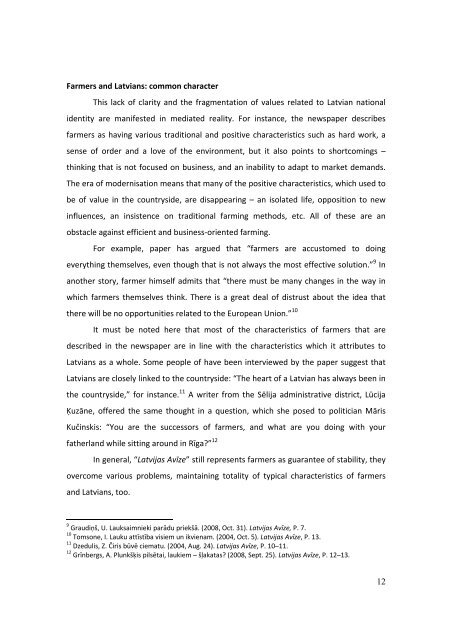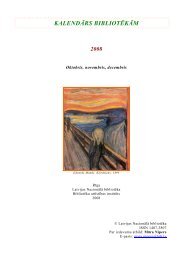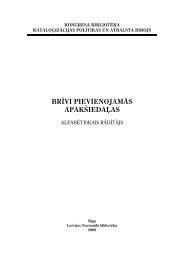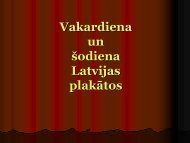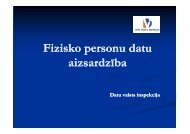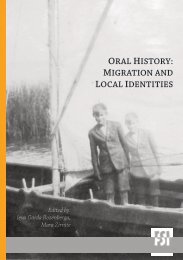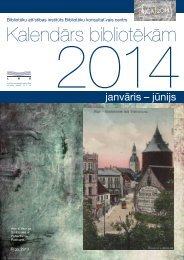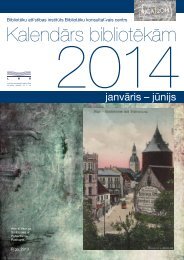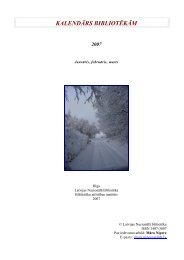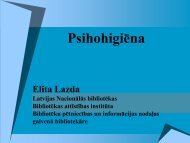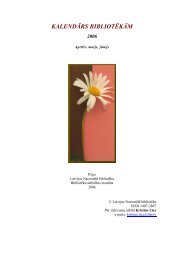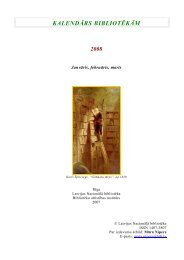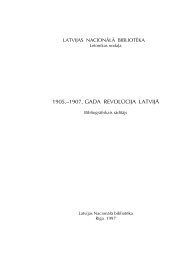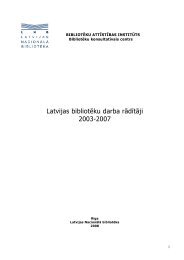representation of the countryside and agriculture as values - Academia
representation of the countryside and agriculture as values - Academia
representation of the countryside and agriculture as values - Academia
- No tags were found...
Create successful ePaper yourself
Turn your PDF publications into a flip-book with our unique Google optimized e-Paper software.
Farmers <strong>and</strong> Latvians: common characterThis lack <strong>of</strong> clarity <strong>and</strong> <strong>the</strong> fragmentation <strong>of</strong> <strong>values</strong> related to Latvian nationalidentity are manifested in mediated reality. For instance, <strong>the</strong> newspaper describesfarmers <strong>as</strong> having various traditional <strong>and</strong> positive characteristics such <strong>as</strong> hard work, <strong>as</strong>ense <strong>of</strong> order <strong>and</strong> a love <strong>of</strong> <strong>the</strong> environment, but it also points to shortcomings –thinking that is not focused on business, <strong>and</strong> an inability to adapt to market dem<strong>and</strong>s.The era <strong>of</strong> modernisation means that many <strong>of</strong> <strong>the</strong> positive characteristics, which used tobe <strong>of</strong> value in <strong>the</strong> <strong>countryside</strong>, are disappearing – an isolated life, opposition to newinfluences, an insistence on traditional farming methods, etc. All <strong>of</strong> <strong>the</strong>se are anobstacle against efficient <strong>and</strong> business‐oriented farming.For example, paper h<strong>as</strong> argued that “farmers are accustomed to doingeverything <strong>the</strong>mselves, even though that is not always <strong>the</strong> most effective solution.” 9 Inano<strong>the</strong>r story, farmer himself admits that “<strong>the</strong>re must be many changes in <strong>the</strong> way inwhich farmers <strong>the</strong>mselves think. There is a great deal <strong>of</strong> distrust about <strong>the</strong> idea that<strong>the</strong>re will be no opportunities related to <strong>the</strong> European Union.” 10It must be noted here that most <strong>of</strong> <strong>the</strong> characteristics <strong>of</strong> farmers that aredescribed in <strong>the</strong> newspaper are in line with <strong>the</strong> characteristics which it attributes toLatvians <strong>as</strong> a whole. Some people <strong>of</strong> have been interviewed by <strong>the</strong> paper suggest thatLatvians are closely linked to <strong>the</strong> <strong>countryside</strong>: “The heart <strong>of</strong> a Latvian h<strong>as</strong> always been in<strong>the</strong> <strong>countryside</strong>,” for instance. 11 A writer from <strong>the</strong> Sēlija administrative district, LūcijaĶuzāne, <strong>of</strong>fered <strong>the</strong> same thought in a question, which she posed to politician MārisKučinskis: “You are <strong>the</strong> successors <strong>of</strong> farmers, <strong>and</strong> what are you doing with yourfa<strong>the</strong>rl<strong>and</strong> while sitting around in Rīga?” 12In general, “Latvij<strong>as</strong> Avīze” still represents farmers <strong>as</strong> guarantee <strong>of</strong> stability, <strong>the</strong>yovercome various problems, maintaining totality <strong>of</strong> typical characteristics <strong>of</strong> farmers<strong>and</strong> Latvians, too.9 Graudiņš, U. Lauksaimnieki parādu priekšā. (2008, Oct. 31). Latvij<strong>as</strong> Avīze, P. 7.10 Tomsone, I. Lauku attīstība visiem un ikvienam. (2004, Oct. 5). Latvij<strong>as</strong> Avīze, P. 13.11 Dzedulis, Z. Čiris būvē ciematu. (2004, Aug. 24). Latvij<strong>as</strong> Avīze, P. 10–11.12 Grīnbergs, A. Plunkšķis pilsētai, laukiem – šļakat<strong>as</strong>? (2008, Sept. 25). Latvij<strong>as</strong> Avīze, P. 12–13.12


